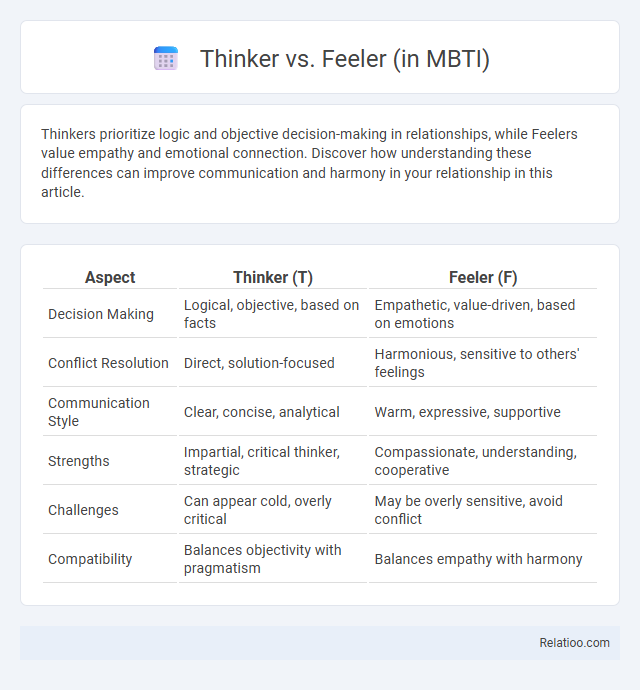Thinkers prioritize logic and objective decision-making in relationships, while Feelers value empathy and emotional connection. Discover how understanding these differences can improve communication and harmony in your relationship in this article.
Table of Comparison
| Aspect | Thinker (T) | Feeler (F) |
|---|---|---|
| Decision Making | Logical, objective, based on facts | Empathetic, value-driven, based on emotions |
| Conflict Resolution | Direct, solution-focused | Harmonious, sensitive to others' feelings |
| Communication Style | Clear, concise, analytical | Warm, expressive, supportive |
| Strengths | Impartial, critical thinker, strategic | Compassionate, understanding, cooperative |
| Challenges | Can appear cold, overly critical | May be overly sensitive, avoid conflict |
| Compatibility | Balances objectivity with pragmatism | Balances empathy with harmony |
Introduction to Thinker vs Feeler in MBTI
Thinker and Feeler represent cognitive preferences in the MBTI personality framework, influencing decision-making processes and interpersonal dynamics. Thinkers prioritize logic, objective analysis, and consistency, often triggering conflicts when emotions are undervalued, while Feelers emphasize empathy, harmony, and subjective values, which can lead to clashes when facts overshadow feelings. Understanding these differences provides insight into conflict triggers rooted in contrasting approaches to problem-solving and communication styles.
Defining Thinkers: Logic and Objectivity
Thinkers in MBTI prioritize logic and objectivity when making decisions, often relying on impartial analysis rather than emotions. Their preference for detachment helps them focus on facts and consistency, which can lead to conflict with Feelers who base choices on values and emotional considerations. This fundamental difference triggers misunderstandings, as Thinkers may appear cold or insensitive, while Feelers may seem overly subjective or emotional.
Understanding Feelers: Values and Empathy
Feelers in MBTI prioritize values and emotional harmony, often placing empathy at the core of their decision-making processes. Your sensitivity to others' feelings can trigger conflict when thinkers prioritize logic and objective analysis over emotional considerations. Understanding this dynamic helps bridge communication gaps and fosters more compassionate interactions.
Core Differences Between Thinkers and Feelers
Thinkers prioritize objective logic and consistency when making decisions, focusing on fairness and truth, whereas Feelers emphasize personal values and harmony, considering the emotional impact on others. Your conflict with a Thinker or Feeler may arise from their contrasting decision-making processes: Thinkers may appear critical or detached, while Feelers can seem overly sensitive or subjective. Understanding these core differences between Thinkers' preference for impersonal analysis and Feelers' need for emotional connection helps navigate interpersonal conflicts more effectively.
Decision-Making Styles: T vs F
Thinkers in MBTI prioritize logic, objective analysis, and consistency, often triggering conflict when emotional considerations are discounted in decision-making. Feelers emphasize empathy, harmony, and values, which can cause tension when decisions appear impersonal or overly rational to them. Understanding Your preference for Thinking or Feeling helps in navigating conflicts by balancing analytical rigor with interpersonal sensitivity.
Communication Preferences of Thinkers and Feelers
Thinkers prioritize logical analysis and objective reasoning in communication, often favoring clarity and directness to resolve conflicts effectively. Feelers emphasize empathy and emotional understanding, seeking harmony and validation to prevent or ease tensions in conversations. Your awareness of these distinct communication preferences can help tailor interactions to reduce conflict triggers and promote mutual understanding.
Strengths and Challenges of Thinkers
Thinkers in MBTI excel at logical analysis and objective decision-making, providing clear, rational solutions during conflicts but may struggle with emotional sensitivity, often triggering tension with Feelers who prioritize values and feelings. Their strength lies in detaching from personal bias to address issues directly, yet this can challenge interpersonal harmony when emotional nuances are overlooked. Developing empathy strengthens Thinkers' conflict resolution by balancing reason with understanding of others' emotional perspectives.
Strengths and Challenges of Feelers
Feelers in the MBTI framework excel at empathy, interpersonal sensitivity, and prioritizing harmony, making them adept at understanding and addressing emotional conflicts. Their strength lies in creating supportive environments where individuals feel valued, but they may face challenges in asserting boundaries or making tough decisions when emotions run high. You can leverage a Feeler's deep emotional insight to resolve conflicts, yet must be mindful of their tendency to avoid confrontation, which can delay necessary resolution.
Navigating Relationships: Thinker-Feeler Dynamics
Navigating relationships between Thinkers and Feelers in MBTI requires understanding their distinct conflict triggers: Thinkers prioritize logic and fairness, often clashing with Feelers' emphasis on emotions and harmony. Thinkers may trigger conflicts by seeming overly critical or impersonal, while Feelers can provoke tension through emotional responses or perceived sensitivity. Effective communication and empathy help balance these dynamics, fostering mutual respect and reducing misunderstandings in personal and professional relationships.
Tips for Harmonizing Thinker and Feeler Traits
Thinkers in MBTI prioritize logic and objective decision-making, while Feelers emphasize values and emotional impact, often triggering conflicts when communication styles clash. To harmonize these traits, practice active listening to acknowledge both perspectives and validate feelings without dismissing logical analysis. Establish clear boundaries and use "I" statements to express needs constructively, fostering mutual respect and reducing misunderstandings.

Infographic: Thinker vs Feeler (in MBTI)
 relatioo.com
relatioo.com